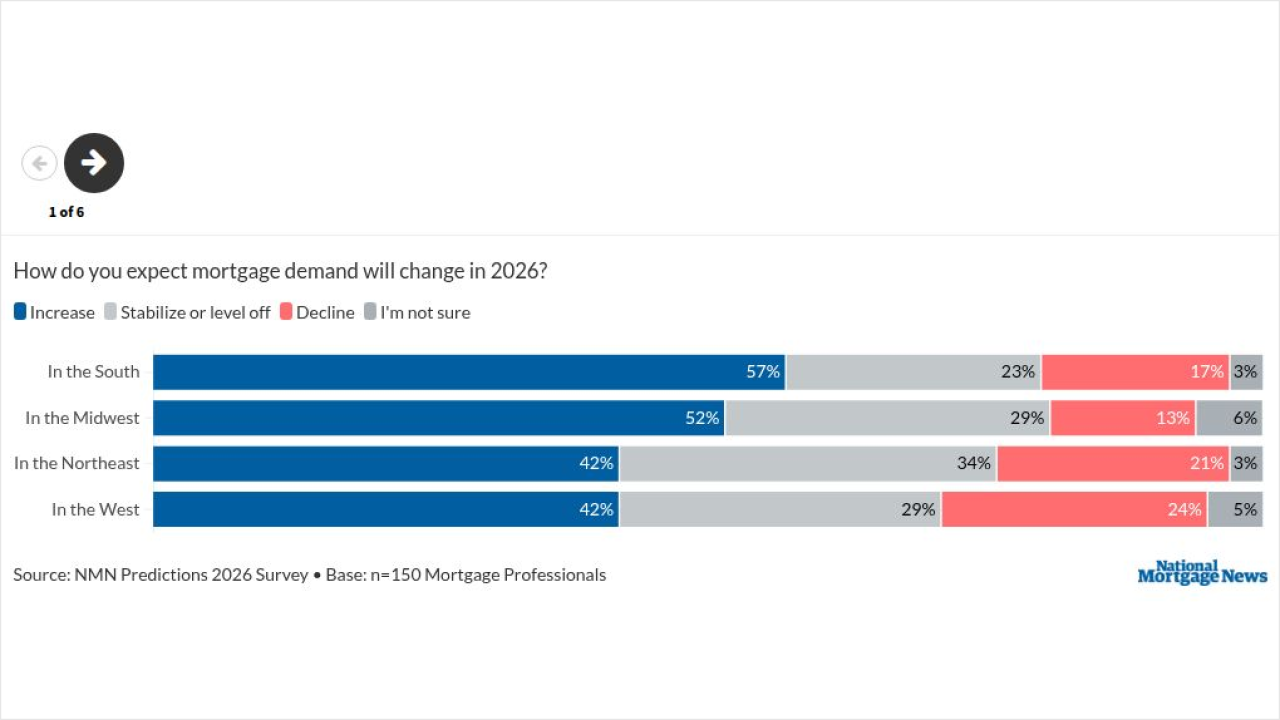Traditional mortgage originations have fallen year-over-year, and even parts of the business with some cyclical advantages like
"Part of the problem is mortgage companies not investing in software, the other part is, they did invest in it, but they're not getting adoption," said Mike Seminari, director of customer experience for the Stratmor Group, an industry consultancy.
If anyone in the industry is finding a way to get technology right despite these challenges, it's lenders that landed on this year's
Sales and marketing support for loan officers
One piece of tech that currently tends to satisfy the average employee the most in this realm is
However, employee preferences can vary by generation, Brown said, noting that as an industry veteran, he finds MBS Highway to be particularly helpful. It's a software product that helps him explain the mortgage-backed securities trends driving rates to clients.
"It provides you with deeper dives to educate borrowers, and what borrowers remember is education," said Brown, noting that he has had to demonstrate the value of this to his team.
Meanwhile, having support for originators on platforms like LinkedIn, Facebook and Instagram has become essential to reaching younger generations.
"To have a social media presence is a must," Brown said, noting that Churchill Mortgage found hiring an expert to manage it proved the most efficient and effective way to handle oversight.
"I get a lot of engagement from clients through the posts that he makes and the things that have been put online, and so I see the value of it. It's helped our brand and our business go forward," Brown said.
An LOS customized to handle home equity
"It's really hard to skinny-down an existing first-mortgage process and make it work where it'll still be compliant and offer a good consumer experience," said Drew Kese, the company's chief experience officer. "We have a core LOS, and what we've done is augment that with our own processes where it doesn't meet the home equity customer's needs."
Differences in process a system may have to accommodate, for example, pulling from a single credit bureau for a home equity product, as opposed to the merged reports first-mortgage originations have traditionally used.
"There are a limited amount of documents, we do a full underwrite, but where we can, we use an automated valuation model and a desktop appraisal that has a drive-by review associated with it," Kese said.
"There's no silver bullet at this point for home equity technology," said Kese. "We use the concept of a 'centaur' process that's half human, half tech, where we're trying to focus on letting people do what they do best, which is interacting with the customer and then letting the system manage the data and make the binary decisions."
A servicing system offering continuity and chronological records
"We've looked at buying other systems, and they're just not as easily adaptable to what we specifically want to do," said Homeownership Division Director Brandon Dettlaff.
An audit-friendly chronological note-taking feature, and a continuous workflow that isn't disrupted by changes between different systems are a couple of the advantages that the proprietary system provides, said Dettlaff.
"If somebody goes into delinquency and all the way into foreclosure, they can see exactly what happened, how we worked, when the borrowers called what they said. All of that is built right into that system," Dettlaff said. "Unfortunately, we do have some collections every now and then and foreclosures we have to deal with."
The company also is in the process of updating the system so that it runs on current computer code and maximizes an efficient workflow based on features like optical character recognition to automate parts of the process that remain stubbornly paper intensive.
"A lot of the insurance companies for some reason like to send paper, so there's a lot of it moving around," said Dettlaff. "We want to have more time to do more customer-facing work trying to do things like help people stay out of foreclosure and explore workout options."




